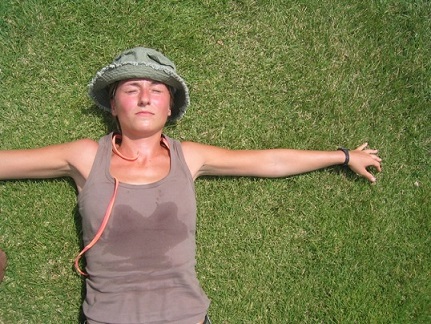Vomiting after workout is not uncommon, but if you find it happening often you should take a hard look at your workout practices. You may need to revise your exercise routine, reduce its intensity, or even cut out specific types of training and exercises. Feeling sick after a hard workout takes the euphoria of a good session and quickly turns it into dread. Further investigation into what might be causing your sickness may help you pinpoint the problem and eliminate it.
What Causes Vomiting after Exercise?
1. Dehydration
 One of the main reasons is dehydration. The harder, faster and more strenuous your workout, the more you sweat. This is often seen in boot camp or cross fit exercise training. The intense activity makes you lose excess water and sodium, which causes an imbalance in your electrolytes. This turns into nausea and can result in vomiting.
One of the main reasons is dehydration. The harder, faster and more strenuous your workout, the more you sweat. This is often seen in boot camp or cross fit exercise training. The intense activity makes you lose excess water and sodium, which causes an imbalance in your electrolytes. This turns into nausea and can result in vomiting.
2. Vagal Reaction
When you experience a sudden drop in blood pressure, you feel nauseated and may even vomit. Some people suffer from a condition, which causes this drop when they exercise, instead of raising the heart beat as in most people. This reaction is called the vagal reaction. It is typically benign and is very rare. Extreme activity can set it off.
3. Acid Reflux
 When your esophageal sphincter muscle is weak, it can relax when it is not supposed to. This allows stomach acids to enter back into the throat, which can result in vomiting after exercise. Intense exercise can trigger this reaction and allow the bile and acids to damage the lining of the esophagus.
When your esophageal sphincter muscle is weak, it can relax when it is not supposed to. This allows stomach acids to enter back into the throat, which can result in vomiting after exercise. Intense exercise can trigger this reaction and allow the bile and acids to damage the lining of the esophagus.
4. Hyponatremia
A sudden drop in your body’s sodium levels is referred to as hyponatremia. Your body protects itself from dehydration by producing ADH, a chemical that keeps your electrolytes in balance. Sometimes after an intense workout or participating in an extreme sport, you might experience vomiting. This is because your body is unable to compensate for the loss of hydration quick enough.
5. Heat Exhaustion
 Heat exhaustion can take hold and knock you off your feet before you know it. Not only can it make you feel nauseated, it can even cause you to pass out. Your body produces lots of heat when you participate in physical activity. You should take frequent breaks, drink lots of fluids and don’t let the weather fool you. A dry heat also means lack of moisture in the air, which results in dehydration and heat exhaustion.
Heat exhaustion can take hold and knock you off your feet before you know it. Not only can it make you feel nauseated, it can even cause you to pass out. Your body produces lots of heat when you participate in physical activity. You should take frequent breaks, drink lots of fluids and don’t let the weather fool you. A dry heat also means lack of moisture in the air, which results in dehydration and heat exhaustion.
How to Prevent It
1. Replace Lost Water
Prevent dehydration by drinking enough water. You should make sure you are properly hydrated before you even start exercising and then drink water throughout your workout. After you finish exercising, drink more fluids to replace the fluids you sweated out. This can prevent vomiting after exercise.
- Symptoms of dehydration may include increased thirst, decreased urine, headache, dizziness, nausea, dry mouth, and muscle weakness.
- Stay hydrated by drinking 2-3 cups of water 2 hours before exercising. Drink 1-2 more cups about 30 minutes before your workout. Then drink ½ cup of fluids for every 15-20 minutes of activity.
2. Steady Sips, Not Gulps
 Drinking your water too fast can cause you to feel nauseated. Even though gulping your drink can give you instant thirst gratification, it will cause your stomach to feel overly full. Instead, sip your water periodically throughout your workout to prevent dehydration.
Drinking your water too fast can cause you to feel nauseated. Even though gulping your drink can give you instant thirst gratification, it will cause your stomach to feel overly full. Instead, sip your water periodically throughout your workout to prevent dehydration.
3. Maintain Blood Sugar Levels
A major cause of vomiting after exercise is low blood sugar levels. Because you are burning calories at a high rate during an intense workout, you may not have enough stored to keep your energy levels up. To prevent your blood sugar levels from dropping drastically, eat about 300 calories an hour or two before you exercise. If you can’t eat before your workout, right after drink a protein shake or eat a banana to restore your body’s full.
 4. Breathe During Weight Training
4. Breathe During Weight Training
It is tempting to hold your breath when weight training, but this can cause your blood pressure to significantly rise, which can make you feel like you are going to get sick. Weight lifters often experience this because they forget to breathe when lifting heavy weights.
5. Minimized Your Bending
If you squat to pick up weights, instead of bending over, you avoid squeezing your stomach. This prevents the feeling of being overly full or triggering acid reflux if you suffer from the condition.
6. Steadily Increase Workout
 To prevent vomiting after exercise, do not overexert yourself when exercising. Steadily increase your workout intensity, maintaining a maximum heart rate between 70-85 heart beats per minute. You may have to avoid intense exercise to keep your rate in the recommended range.
To prevent vomiting after exercise, do not overexert yourself when exercising. Steadily increase your workout intensity, maintaining a maximum heart rate between 70-85 heart beats per minute. You may have to avoid intense exercise to keep your rate in the recommended range.
7. Other Remedies
- Wait after eating to exercise:Give your body time to digest your food before working out. This will allow time for your stomach to settle and absorb the nutrients you need to maintain your energy levels.
- Drink power drinks: Drinking power drinks during your workout can assist in maintaining your blood sugar levels and keeping you hydrated.
- No sodas: Do not drink sodas before working out, during exercise, and immediately afterwards. The carbonation produces stomach gas, which can result in nausea.
- Keep your eyes open: During intense workouts or when straining while exercising, you may be tempted to close your eyes. Don’t. If you do, you may get a feeling similar to car sickness. This can lead to nausea and headache.